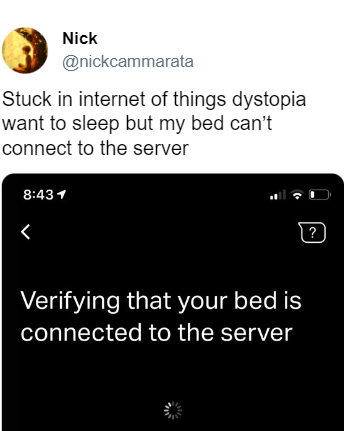Good Monday Morning
It’s September 25th. Spotlight is off next week and back with you on October 9th.
Today’s Spotlight is 892 words — about 3 1/2 minutes to read.
3 Stories to Know
1. Wirecutter revoked its endorsement of Wyze security cameras after a breach allowed some users to access live video from other users’ cameras. The NYT feature criticized Wyze’s communications and security measures, urging the company to be proactive, accountable, and transparent.
2. Meta will allow Facebook users to create up to four additional personal profiles, embracing the “finsta” concept. Aimed at separating personal and professional lives, these extra profiles come with limitations, including no support for Messenger, Facebook Dating, or Marketplace.
3. Amid ongoing scrutiny for throttling competitor links, X — formerly Twitter — faces further turbulence as Elon Musk announced plans for a “small monthly payment” to combat bots. X is taking up to 100 times longer to load links to competitors such as Facebook and Substack, according to an analysis by The Markup.

Spotlight on The Illusion of Ownership
Think you own that eBook? Think again.
In a digital world, ownership and licensing blur; from Amazon’s ads to George R.R. Martin’s lawsuit against OpenAI, buckle up as we explore the shifting landscape.
Consider:
- Ads in Amazon Prime Video: Settling in for movie night? Expect ads in your ‘ad-free’ Amazon Prime Video next year. Still feel like you own that movie?
- E-Books That Change: Hitting “buy” often means renting. Your e-books can be edited or vanish without notice.
- Authors vs. AI: George R.R. Martin and other authors are suing ChatGPT maker OpenAI for using their work without permission. Critical: Who owns the AI-generated content?
- Movies That Disappear: Ever lose an ‘owned‘ digital movie? Platforms can lose licensing rights, and your copy can vanish. Refunds aren’t guaranteed.
What we think of as “ownership” is often just a changeable lease, but artists, writers, and musicians are taking matters into their own hands.
- High-Profile Cases: Author George R.R. Martin isn’t only dealing with the Iron Throne; he’s also in a legal fight with OpenAI over the use of his work to train its large language models. He’s not alone; creators are suing tech companies for using their work without permission.
- Hollywood Writers’ Strike: Writers have been on strike for 5 months, demanding fair streaming revenue and protection against AI job loss.
Lawsuits and strikes could change the game. Imagine a future where your favorite author’s new book isn’t online due to a legal dispute, or your curated music playlist vanishes. These battles impact what you can and can’t do with content you think you own.
In a world where digital ‘ownership’ is an illusion, stay informed and question what you’re really getting when you press ‘buy.’ The landscape is shifting — stay vigilant.
Practical AI
Quotable: “I think we’re still a way away from: ‘ChatGPT, please write a Wikipedia entry about the Empire State Building’, but I don’t know how far away we are from that, certainly closer than I would have thought two years ago,”
—Wikipedia founder Jimmy Wales to The Evening Standard
Indeed on Job Futures: Indeed’s “AI at Work Report” finds that GenAI will impact nearly every U.S. job, with software development roles most vulnerable and driving jobs least exposed. The report analyzed 55 million job postings to assess the reach of GenAI.
Tool of the Week: YouTube is rolling out new tools that include an AI-generated image or video background tool for YouTube Shorts, a mobile editing app, and an automatic dubbing tool to create content in multiple languages.\
Trends, Spend & TikTok



Did That Really Happen — Immigrants Pay Taxes, Rent
AP Fact Check debunks new viral claims on Instagram and X that immigrants in the U.S. don’t pay taxes or rent, clarifying that many immigrants, including those undocumented, contribute to tax revenue and pay for housing.
Also an issue: claims of 18 million unauthorized immigrants when experts put the actual number 40% lower.
Following Up — Passkeys Spread
1Password is rolling out passkey support for its web browser extension, enhancing security features we’ve previously covered. The update allows users to generate unique, secure keys for each site, improving overall account safety. Those passkeys can be accessed by PIN, fingerprint, or face scan — removing the need for passwords.
Protip — Transfer to an iPhone 15
CNET offers a step-by-step guide on transferring your data to Apple’s new iPhone 15. The article covers everything from iCloud backups to direct device-to-device transfers.
Screening Room — Father Knows Best-ish
Science Fiction World — Make All the Lights
An Audi technology known as Traffic Light Information advises drivers on the optimal speed to hit all green lights. The Autopian wonders why this feature isn’t more widely discussed, given its potential to improve driving efficiency. Wouldn’t you drive a certain speed to miss red lights?
Coffee Break — Hidden Spotify Game
Spotify’s mobile app has a hidden snake game. The Easter egg is called “Eat this Playlist,” and the game includes cover art from your playlist’s tracks.
Sign of the Times











